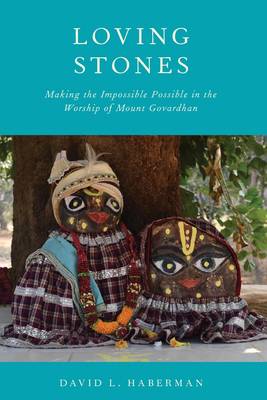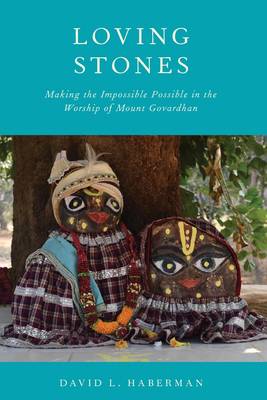
- Afhalen na 1 uur in een winkel met voorraad
- Gratis thuislevering in België vanaf € 30
- Ruim aanbod met 7 miljoen producten
- Afhalen na 1 uur in een winkel met voorraad
- Gratis thuislevering in België vanaf € 30
- Ruim aanbod met 7 miljoen producten
Zoeken
Loving Stones
Making the Impossible Possible in the Worship of Mount Govardhan
David L Haberman
Paperback | Engels
€ 74,45
+ 148 punten
Omschrijving
Loving Stones is a study of devotees' conceptions of and worshipful interactions with Mount Govardhan, a sacred mountain located in the Braj region of north-central India that has for centuries been considered an embodied form of Krishna. It is often said that worship of Mount Govardhan "makes the impossible possible." In this book, David L. Haberman examines the perplexing paradox of an infinite god embodied in finite form, wherein each particular form is non-different from the unlimited. He takes on the task of interpreting the worship of a mountain and its stones for a culture in which this practice is quite alien. This challenge involves exploring the interpretive strategies that may explain what seems un-understandable, and calls for theoretical considerations of incongruity, inconceivability, and other realms of the impossible. This aspect of the book includes critical consideration of the place and history of the pejorative concept of idolatry (and its twin, anthropomorphism) in the comparative study of religions. Loving Stones uses the worship of Mount Govardhan as a site to explore ways in which scholars engaged in the difficult work of representing other cultures struggle to make "the impossible possible."
Specificaties
Betrokkenen
- Auteur(s):
- Uitgeverij:
Inhoud
- Aantal bladzijden:
- 328
- Taal:
- Engels
Eigenschappen
- Productcode (EAN):
- 9780190086725
- Verschijningsdatum:
- 18/03/2020
- Uitvoering:
- Paperback
- Formaat:
- Trade paperback (VS)
- Afmetingen:
- 155 mm x 231 mm
- Gewicht:
- 544 g

Alleen bij Standaard Boekhandel
+ 148 punten op je klantenkaart van Standaard Boekhandel
Beoordelingen
We publiceren alleen reviews die voldoen aan de voorwaarden voor reviews. Bekijk onze voorwaarden voor reviews.











